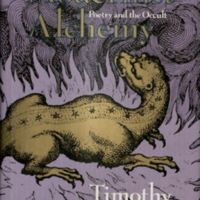Modernist Alchemy: Poetry and the Occult
Dublin Core
Title
Modernist Alchemy: Poetry and the Occult
Description
The occult has been a source of both ideas and images for modern poets from W.B. Yeats to James Merrill. Poets as diverse as Ezra Pound, H.D., Sylvia Plath, Robert Duncan, and Ted Hughes were both fascinated by, and skeptical of, such phenomena as alchemy and astrology, Ouija boards and Tarot cards, Indian mysticism, the kabbalah, and gnosticism. All of these poets, Timothy Materer says, approached the occult with a modernist sophistication and a self-consciousness that are not entirely credulous nor entirely skeptical. Modernist Alchemy takes a close look at the work of twentieth-century poets whose use of the occult constitutes a recovery of discarded beliefs and modes of thought: Yeats and Plath try to dismiss conventional religion, Hughes captures a sense of adventure, H.D. seeks to liberate repressed concepts, while Duncan and Merrill hunt for a lost understanding of sexual identity which will allow for androgyny and homosexuality.
Materer ends with Merrill, whose attempt to suspend both doubt and belief marks the culmination of the poetic style initiated by Yeats.
Materer ends with Merrill, whose attempt to suspend both doubt and belief marks the culmination of the poetic style initiated by Yeats.
Creator
Timothy Materer
Publisher
Ithaca : Cornell University Press
Table Of Contents
Introduction: Literary Occultism -- 1. Daemonic Images: From W.B. Yeats to Ezra Pound -- 2. Ezra Pound as Magus -- 3. T.S. Eliot: Occultism as Heresy -- 4. H.D.'s Hermeticism: Between Jung and Freud -- 5. Robert Duncan and the Mercurial Self -- 6. Sylvia Plath: Occultism as Source and Symptom -- 7. Ted Hughes's Alchemical Quest -- 8. James Merrill's Romantic Unconscious.
Text Item Type Metadata
Original Format
Book
Citation
Timothy Materer, “Modernist Alchemy: Poetry and the Occult,” Humanities Hub, accessed February 27, 2026, https://humanitieshub.sdsu.edu/omeka/items/show/1635.


